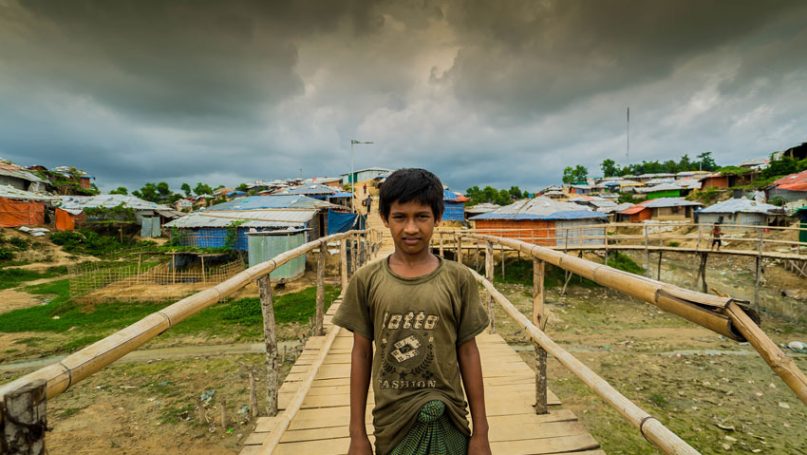
This August marks the third anniversary of the tragic Rohingya refugee crisis. There are various interpretations of this issue, but no one can deny the fact that the dire situations in the refugee camps in Bangladesh’s Cox’s Bazar remain a traumatic reality amid the spread of the COVID-19 pandemic. As of 5 July 2020, the World Health Organization reported 53 confirmed cases of COVID-19 among the refugees and the host community in Cox’s Bazar. The numbers seem relatively low, but the true prevalence is unknown as the low number of confirmed cases may be more indicative of negligible testing than the actual spread of the disease. In fact, the International Organization for Migration (IOM) and Assessment Capacities Project (ACAPS), a Geneva-based NGO’s recent report indicates that the overcrowded living conditions in the camps, the reliance on unhygienic public bathing facilities and the lack of masks make it impossible for the Rohingya refugees to practice physical distancing, leaving them vulnerable to viral infection. Further research by ACAPS also suggests that the average population density of the camps in Cox’s Bazar is 40,000 people per square kilometre, whereas the population density of Wuhan is 6,000 people per square kilometre. As social distancing simply cannot be observed in Cox’s Bazar, it would not be surprising to see the refugee camps turn into another epicentre of the coronavirus pandemic.
It is important to recall that, over the last few years, the Myanmar and Bangladesh governments signed agreements for the return of the Rohingya refugees in Cox’s Bazar and made several efforts to begin repatriation unfortunately to no avail. In addition, as the number of COVID-19 confirmed cases in Myanmar continues to show an upward trend, the fifth meeting of the Joint Working Group—a mechanism formed by Naypyitaw and Dhaka to handle repatriation—has been put on a temporary hold. Also, with the 2020 general election date quickly approaching, Myanmar’s political landscape has long since shifted into election mode. Under such a political context and with the world being preoccupied with the COVID-19 pandemic, the Rohingya repatriation issue is not receiving the level of attention it deserves and is showing no signs of being resolved for the time being. Thus, it is time that all parties involved in the resolution of the Rohingya issue—the Myanmar and Bangladesh governments as well as relevant UN agencies—accepted the reality that the repatriation of the Rohingya refugees in Cox’s Bazar will not happen anytime soon and instead directed their available resources toward improving the living conditions in the camps. For instance, the recent announcement of the 2020 Joint Response Plan (JRP) to support the COVID-19 response projects for the Rohingya refugees and affected host communities is a great initiative that uses resources to stabilise the situations in the refugee camps.
While the international community’s humanitarian support toward Cox’s Bazar continues, the Myanmar government should also ponder on taking part in this concerted effort. For example, it could consider officially dispatching a medical team to Cox’s Bazar to support the COVID-19 response projects. This may be viewed as a small gesture by some, but the impact will be significant. At first glance, given the prevalent anti-Rohingya sentiment within Myanmar, dispatching healthcare workers to Cox’s Bazar is bound to be a political burden on the National League for Democracy (NLD), Myanmar’s ruling party. But it should also be noted that the Myanmar government and the Myanmar Armed Forces (Tatmadaw) have a history of dispatching medical teams to ethnic armed groups in the China-Myanmar border area to prevent the spread of COVID-19 (See here and here for examples). If the Myanmar government and the Tatmadaw could send medical staff to their opponents, the possibility that they could take similar action toward the refugees in Cox’s Bazar is clearly a viable option.
Meanwhile, if the Myanmar government pre-emptively indicates its willingness to provide support in improving the living conditions of the Rohingya refugees in Cox’s Bazar, this move would help relieving some of the distrust of the Rohingya refugees who believe that the Myanmar government does not guarantee their safe return. By doing so, the Myanmar government would be able to proclaim that it is willing and able to take all measures within its power to support the humanitarian operations in Cox’s Bazar, which could signal to the international community that Myanmar is doing its utmost to assure the refugees’ safety and well-being. In addition, such action may significantly change the West’s perception toward Myanmar as a human rights suppressor, induce the relaxation of the sanctions against Myanmar and ultimately lead to Myanmar’s overall economic recovery.
In sum, it appears that the repatriation of the Rohingya refugees in Bangladesh is likely to remain in limbo for the foreseeable future and even more so under the COVID-19 circumstances. The international community should direct available resources toward stabilizing the livelihoods of the refugees in Cox’s Bazar. The Myanmar government ought to also consider taking a much more proactive stance on this issue, which would be a great strategy to achieve both political and economic benefits in the long run. Who knows? This just may be the first step in solving the Rohingya conundrum.
Further Reading on E-International Relations
- Opinion – Identity Politics and COVID-19 in Myanmar’s Rakhine State
- Opinion – Addressing the Regional Security Risks of Rohingya Camps
- Resolving the Rohingya Crisis Requires Justice in Myanmar and Solidarity with Bangladesh
- Opinion – Lessons America’s Adversaries Can Learn from the Covid-19 Pandemic
- Africa’s Disproportionate COVID-19 Pandemic
- Opinion – How to Call the COVID-19 Pandemic and Why it Matters